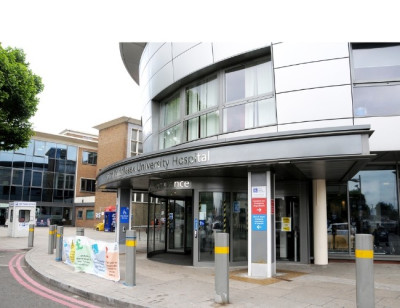Our psychological therapies, neuropsychology, and counselling (PTNC) service focuses on the holistic care of our patients.
Psychological distress may occur as a result of a patient’s medical condition or may be exacerbated by their condition, or the condition may have impacted their cognitive functioning (activities of the brain).
The service is based within some of the specialty areas in our hospitals. Each speciality has their own criteria about when the PTNC service should become involved in a patient’s care.
The PTNC team treats distress caused by the injury, surgery, or condition that the patient is being treated for. It aims to help the patient be better placed to manage their condition or treatments and improve their quality of life.
It can also provide support, if appropriate, to help reduce the impact of mental health or neurological difficulties on physical health and care.
The service provides tailored care and sometimes involves working with other clinicians such as doctors, nurses or therapists.
The team will first assess you to determine whether you are being seen in the service best suited to your needs.
After this, you might be offered further assessment (eg neuropsychological testing) or interventions (eg individual or group talking therapies, in person or online). The team may also talk to people who support you locally, such as your GP.
Being diagnosed with a physical health condition, sustaining an injury, or even pregnancy can affect your life in many ways.
Our team provide psychological assessment, consultation and interventions, which focus on helping people manage their physical health condition and its impact on their quality of life and emotional wellbeing.
Typical interventions include:
- helping people come to terms with or adjust to their health condition and treatment
- helping people make decisions about treatment
- helping people to cope with the impact of their physical health condition on their work life, relationships, and overall wellbeing
- assisting people to make lifestyle changes that maintain and improve health and wellbeing
Our psychologists are embedded within the following specialties. Referrals are accepted from healthcare professionals within these services.
- cardiac rehabilitation
- chronic fatigue
- clinical immunology
- dermatology
- diabetes
- ear, nose and throat (ENT)
- haemophilia
- HIV
- intensive care
- liver transplantation
- oncology
- pain
- palliative care
- plastic surgery
- severe asthma
- sickle cell
- women's health
The PTNC service is not an emergency service, so if you (or your loved one) have a mental health emergency or are in immediate danger to yourself or to others, please contact your GP and/or your local mental health crisis team.
The 24-hour crisis telephone numbers by borough are:
- Barnet, Enfield and Haringey: 0800 151 0023
- Camden and Islington: 0800 917 3333 (or contact their community mental health team)
- Westminster and Brent: 0800 0234 650
Our team supports other healthcare professionals in their roles to promote the psychological wellbeing of people accessing healthcare services.
Reflective groups are run that offer teaching and training to doctors, nurses and allied health professionals to promote the psychological skills and knowledge of healthcare staff.
The service receives a lot of requests relating to work experience and placements, and is not able to accommodate them all. Placements can only be offered to those who meet the following criteria:
- Undergraduates who are undertaking a psychology honours degree which incorporates a placement year (i.e a ‘sandwich’ course). Interested students can apply through a competitive process of application and interviews (usually held in December for the following academic year). The service can usually accommodate three or four students each academic year. Please speak to your university placement coordinator to establish whether or not potential placements are advertised at your university. If not, please ask your placement coordinator to email us.
- Students who are enrolled on the MSc in counselling and psychotherapy at Birkbeck University, WPF psychotherapy training, or the doctorate in counselling psychology at City University, can email the service to find out about current placement availability.
- Trainee psychologists who are enrolled on a doctorate in counselling psychology can secure a placement if the service has not been allocated to a trainee clinical psychologist on placement or there are additional clinical requirements. Email the service for more information.
Many of our specialties offer placements to trainee clinical psychologists who are on a doctorate course in clinical psychology. These placements are allocated regionally.
Unfortunately, the service is not able to offer any other form of placement or work experience within the department, for example during the school or university holidays, or to students following completion of their undergraduate degree.
Many PTNC service clinicians are involved in research, teaching their own and other professions, and representing their service in local and regional forums, and presenting at national and international conferences.
Research forms an important part of the service’s work to better understand the difficulties patients experience, work out whether what the service does is helpful, and determine the impact of interventions provided.
There are several research studies across the trust that are led by or involve PTNC service clinicians.
The service also develops new ways of working and will always test these. This means you may be approached by staff to ask if you want to take part in research. This can involve filling out questionnaires or being interviewed.
Referral for PTNC is through the specialist services in the first instance. For example, to receive an appointment with a cardiac rehabilitation psychologist, you need to be under the care of our cardiology department.
After your referral, PTNC staff will arrange an initial appointment. The aim of this first meeting is to get to know you a little, to understand the issues that are concerning you and to see if there is anything that can be worked on together that would make things better.
A plan can then be made about when and where to meet next, or it may be that a community-based service may be the best placed to meet your needs. The team can help you to access this.
Following this first appointment, your clinician will usually write to your referrer and GP to share some information. They may also talk to people who support you locally if this is important in making a plan for you. They will let you know what they want to tell other people.
If you need an interpreter or help with mobility, hearing or sight, please let the team know and they will make the appropriate arrangements.
What to expect when you are referred to the service
You will be offered an initial assessment consultation to discuss your current health in the context of your background and daily life.
You will have the opportunity to speak about your concerns and to consider jointly how you can best be supported.
Following this consultation the psychologist may suggest other services to access that may suit your needs, or they may offer you further psychology sessions within their service.
 Translate
Translate





